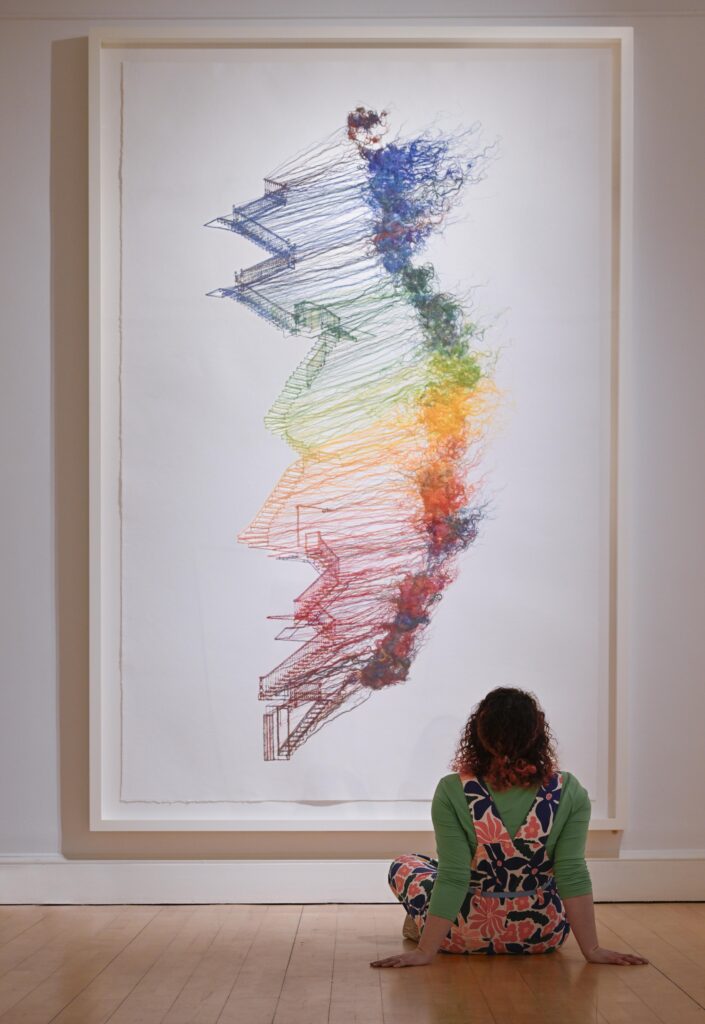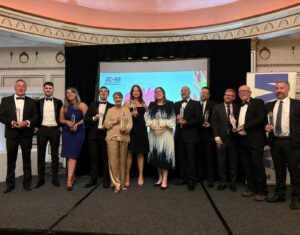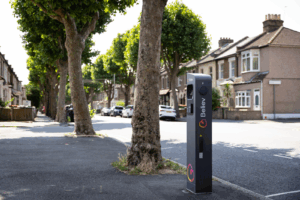World leading contemporary artist Do Ho Suh opens his first Scottish exhibition

Immerse yourself in the imagination of one of the world’s leading contemporary artists. This weekend, Do Ho Suh (born 1962, Seoul), brings his first Scottish exhibition to National Galleries Scotland: Modern One. Don’t miss this unique opportunity to marvel at Do Ho Suh’s larger-than-life thread drawings, take in his never-before-seen sketchbooks and wander through the artist’s iconic architectural hubs, experiencing Suh’s colourful, interconnected, life-size ‘homes’.
Do Ho Suh: Tracing Time is free to visit, taking over the entire ground floor of Modern One in Edinburgh until 1 September 2024. This major solo exhibition by the South Korean-born, London-based artist will be the largest European exhibition to date of his work on paper, with artworks spanning 25 years of Suh’s career. With over 100 works on display, many never seen before, the artist poses questions such as ‘Where and when does home exist?’ and ‘What defines our sense of place?’.
Do Ho Suh: Tracing Time explores the important role that drawing and paper play in Suh’s work, focusing on his collaborative methods, experimental techniques, and ingenious use of materials. The exhibition will travel forwards and backwards in time, organised according to the artist’s transformative approaches to drawing as a toolkit with endless possibilities.
Visitors will discover Suh’s compelling and technically innovative thread drawings, where multicoloured threads are embedded in handmade paper to create sewn images of some of the artist’s most iconic motifs. Thread takes on a new form as a mode of drawing, mirroring the use of fabric in the artist’s sculptures. The thread drawings are created at STPI – Creative Workshop & Gallery, Singapore, where Suh has been working collaboratively with the Creative Workshop team for over a decade; experimenting together to produce his works on paper. Works on display from this series include the dazzling Staircase/s (2019); a seemingly impossible vertical stack of colour, winding and repeating the communal staircase from Suh’s New York apartment building, the embroidery process creating a cloud of loose threads in its wake.
These monumental thread drawings will be exhibited alongside animations, architectural rubbings, paper sculptures, printmaking and watercolours, including works such as A Perfect Home (1999); a simple, even childlike, drawing of a tiny home and garden, perched in an impossible location. This watercolour was the starting point for the artist’s longest running research project, The Bridge Project, which explores the idea of his ‘perfect’ home. The project considers what form this home might take and questions whether such a thing exists. For Suh, it’s located in the centre of a bridge that connects Seoul, New York and London, the three cities he has called home. The Bridge Project demonstrates that a sketch has the power to develop into something far greater. A selection of the artist’s sketchbooks will also be shown publicly for the first time, giving visitors an insight into the personal, unconstrained spaces in which Suh explores his past, present and future.
Using both practical problem solving and imaginative sketching, drawing helps Suh to imagine new relationships between architecture and the body, and new ways of challenging and re-defining shared public spaces. The exhibition includes an immersive installation of Suh’s famed ‘hubs’; life-size sculptures that recreate in colourful fabric transitional spaces – thresholds, corridors and doorways – inspired by sites meaningful to the artist. Visitors to the exhibition can enter and move through these installations, giving a real-scale sense of the places which hold significance to the artist. The translucency of the fabric which forms these hubs expands on the idea of memory being personal and subjective. It also highlights the rigidity of Western architecture in comparison to traditional Korean buildings. Suh’s fabric architecture can be packed down and transported; a means of carrying home with you.
Paper is also treated as sculptural material. Tracing Time includes a series of Suh’s ‘rubbings’; works made using a physically challenging process of coating the entire interiors of rooms in paper, which is then carefully rubbed in pencil and chalk to create an impression of the original spaces.
Suh’s engaging and imaginative artworks collectively ask questions about home and identity, inviting visitors to consider their own answer. Individual experiences of what home is on a personal level can create a fundamental part of who we are, often influenced by day-to-day life and deepest memories. Drawing is Suh’s way of navigating the world, capturing overlooked details, and making sense of how we relate to one another.
Tracing Time gathers many threads of the artist’s work and its celebration of human collaboration and creative networks.
Do Ho Suh said: “I am thrilled to be presenting my first exhibition in Scotland at the National Galleries. Paper has been a foundational element of my practice for as long as I’ve been working. It’s more than a medium for me and I’ve sometimes felt that in the West, paper’s strength – literally and symbolically – is underestimated. For me, it has sculptural, architectural and bodily qualities. It works in part because of its mercurial capacities – the ways in which it can absorb, and integrate with, other materials, rather than merely providing a surface for them to sit on. It’s exciting to have this element of my practice engaged with so sensitively and I cannot wait to share this body of work at Modern One.”
Anne Lyden, Director-General at the National Galleries of Scotland said: “The National Galleries of Scotland are delighted to welcome the wonderfully imaginative and thought-provoking artwork of Do Ho Suh to Modern One; a monumental first not only for the galleries but for Scotland. Do Ho Suh: Tracing Time challenges our perception of the art of drawing, showing the endless possibilities that can stem from putting our ideas, thoughts and dreams onto a blank page. Tracing Time also provides a space to reflect and consider the topic of ‘home’; the interconnecting thread which collectively binds us to the places, and people, that impact us the most. We hope our visitors will join us in witnessing this awe-inspiring experience at Modern One and take some time to marvel in the ingenious, creative flair of one of the most remarkable artists working today.”



